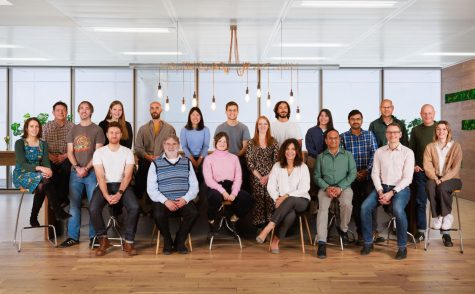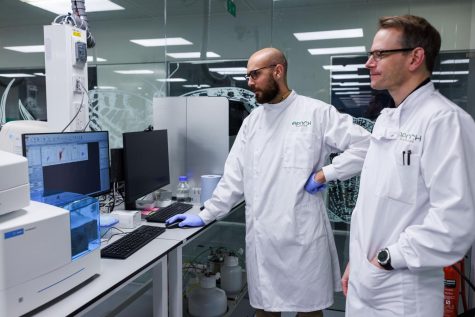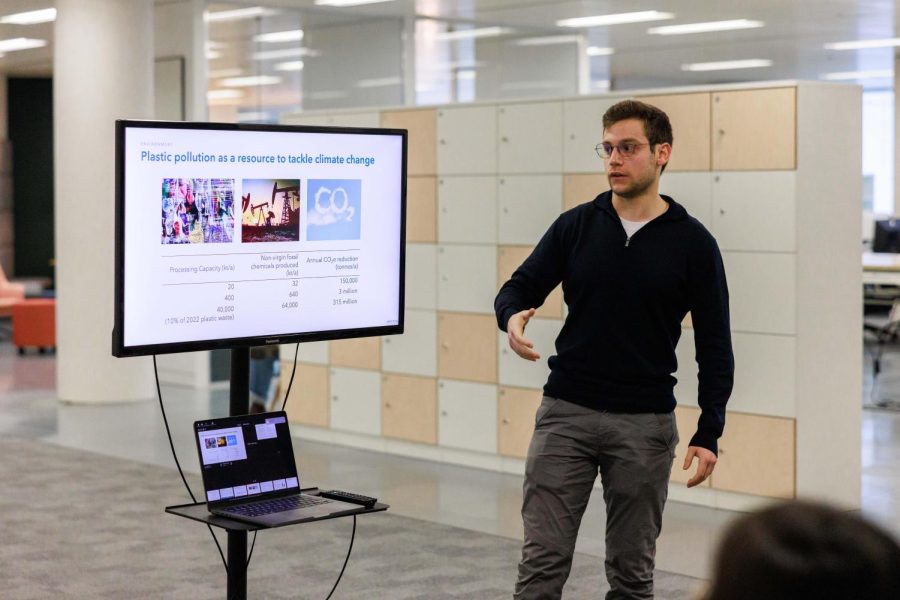Photo courtesy of Jacob Nathan
Co-Founder and CEO of Epoch Biodesign Jacob Nathan (’19) recounts his journey in sustainability. Epoch Biodesign utilizes bio-recycling to minimize plastic waste to mitigate the worsening effects of climate change.
Epoch BioDesign founder Jacob Nathan tackles plastic waste
Growing up, Jacob Nathan (’19) was inundated by the natural world. For him, it was merely an extension of the immediate urban landscape he inhabited.
“With that, I saw the impact humans were having on the planet,” he said. “The natural world was not as abundant as it might once have been.”
Sustainability Council involvement
In high school, Nathan joined the Sustainability Council, where he made it his mission to push climate change and students’ responsibilities in its amelioration to the forefront of their minds.
“I didn’t really feel like climate change was part of the agenda during my time in high school, but with SusCo, it was much more so,” he said.
In his time as Co-President during the 2018-19 school year, Nathan said there was a perceptible evolution in the attention climate change received, with students attending multiple climate walkouts organized during his SusCo tenure.
“I’d like to say that shift was because of the work that we were doing, getting people to feel confident in leaving class and protesting something they were passionate about,” he said.
While SusCo primarily worked to increase student environmental activism, Nathan said it unveiled the constraints of individual advocacy.
“There’s only so much you can do,” he said. “You can make choices as a consumer, you can choose which party to give your vote, but at the end of the day, you’re actually quite limited in what you as an individual can do.”
Kickstarting Epoch Biodesign
Acknowledging the limits of activism, Nathan pivoted to tackle climate change as an entrepreneur instead.
His journey in co-founding the company Epoch Design began in his Grade 12 Advanced Research Colloquium course, where Nathan researched isolating bacteria to break down plastic waste.
Upon encountering obstacles, Nathan thought to himself, “Right, okay. I don’t have a Ph.D., so let me find somebody much smarter than me to help me figure these problems out.”
With the help of Google, Nathan sought out the “best person in the country” with whom to dive into extensive research. He found his way to Douglas Kell, a part-time professor at the University of Liverpool working in synthetic biology.
In partnership with Kell, Nathan joined forces to plan further experiments and gather initial results. They applied for government funding, successfully matched with private investment from a venture capital firm and made their first hire. Then, COVID-19 hit.
Despite halted progress, Nathan used the time afforded by the pandemic to refine his business proposal and the technology path involved in launching his business.
“It was a pivotal time for us,” he said. “It slowed things down a good bit, but we used the time to really hone down on these specific parts of the company that needed additional thought.”
Nathan came to realize business enables one to “rapidly scale replacement solutions to existing manufacturing processes,” while also developing technologies that facilitate the restoration of the planet’s health.
“For me, it’s gone from this journey of my own personal choices and impact – including activism work, where I put my vote, where I make my voice heard,” he said. “But then really trying to get my hands dirty in attacking this problem from a business angle.”
Continuing the research Nathan pioneered in Grade 12, Epoch Biodesign develops enzymes to convert unrecyclable plastic waste into renewable chemicals. Now, Nathan’s team at Epoch Biodesign has expanded to 21 and is set to increase to 30 by the end of 2023, along with an expansion of scaled-up technology.

Journey to CEO
At the very beginning, Nathan had no interest in being the Chief Executive Officer of Epoch. Yet, in his work with the team, he discovered leadership was the best means to achieve his company’s goals.
“I realized I had a real passion for getting people excited about what we’re doing,” he said. “I loved working with people in doing something really difficult. I was ultimately on this incredibly steep learning curve that’s enabled me to learn something new every single day and be surrounded by incredibly smart people.”
Company inner workings
Nathan said Epoch Biodesign teeters on the precipice of the public’s understanding of biology and the development of technologies such as high-power computing and artificial intelligence.
“Humans can look at these cells, these proteins, these enzymes, and they’re like magic to us – we can’t really comprehend them,” he said. “But, if you give a lot of this data to machine learning models, then you can begin to pull out trends. It can help you to understand how these systems work and what the fundamental rules are.”

He predicts that as artificial intelligence rapidly advances, the ability to control and manipulate the inner workings of biology – namely through DNA sequencing and synthesis – will move biology to the fore of many facets of climate work.
Nathan said Epoch Biodesign continues to build technology that unpacks biological systems.
“We’re particularly interested in this problem of plastic waste and decarbonizing chemicals production,” he said. “It’s displacing a double-digit percentage of chemicals production with this more sustainable method that, for us, is a success.”
Pursuing environmental passion
For those interested in pursuing their environmental passion, Nathan urges them to start now.
“Find the things that you’re passionate about,” he said. “Frankly, it’s all hands on deck at the moment. Humanity has a set of incredibly difficult problems to solve. The more people working on them, the more likely we are to solve them.”
From the entrepreneurial perspective, Nathan said he believes climate startups will become the most significant ventures.
“There’s a huge, huge opportunity to not just kind of make money but make money whilst having a really, really positive impact on the future of our planet,” he said. “That combination is incredibly exciting.”
Nathan said climate change work seeps into every vocation and is remarkably multifaceted.
“Working in climate doesn’t just mean building businesses or wearing a white lab coat,” he said. “It means creating new products and brand identities through effective storytelling and marketing. It means bringing the world along during this transition by ensuring equal access to these technologies and information sharing through proper journalism. It means pushing the climate to the top of the agenda through art and creative endeavor.”
For Nathan, his work defines the future, where “every job can and will be a climate change.”


